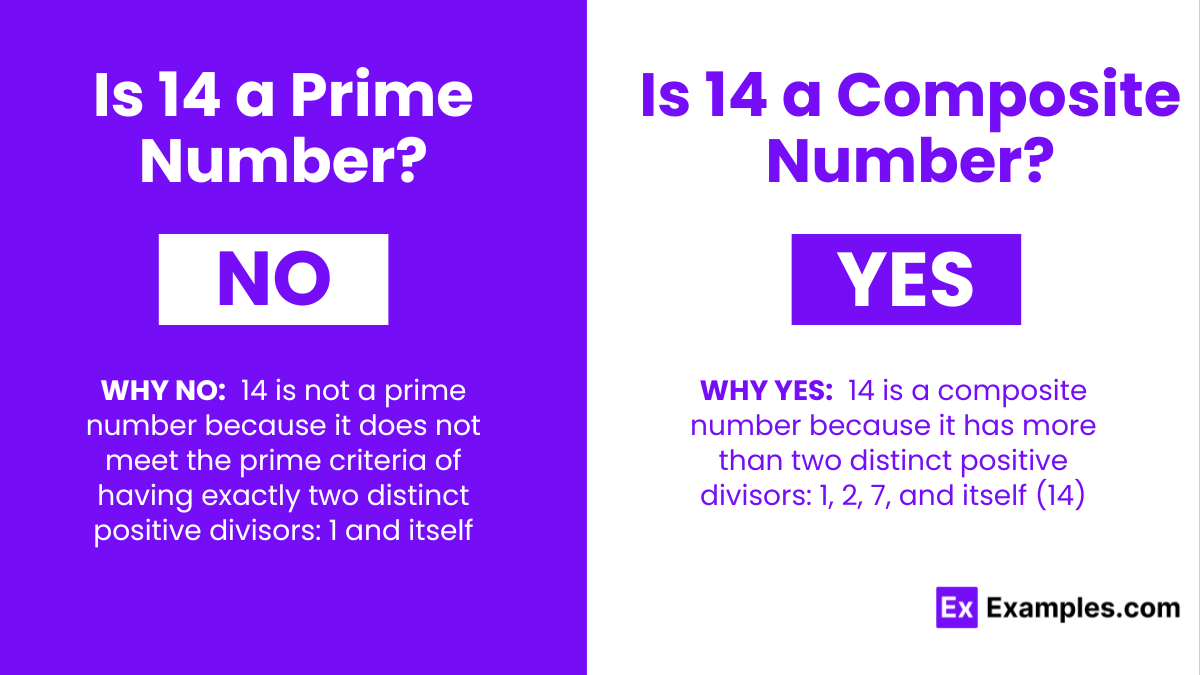Is 14 a prime number or a composite number?
Prime
Composite
Neither
Both


No – 14 is not a prime number.
Why No: 14 is not a prime number because it does not meet the prime criteria of having exactly two distinct positive divisors: 1 and itself. Instead, 14 has divisors 1, 2, 7, and 14.See any number if it’s prime number or not
YES – 14 is a Composite Number
Why Yes: 14 is a composite number because it has more than two distinct positive divisors: 1, 2, 7, and itself (14).
| Property | Answer |
|---|---|
| Is 14 a prime number? | No |
| Is 14 a composite number? | Yes |
| Is 14 a perfect square? | No |
| Factors of 14 | 1, 2, 7, 14 |
| Multiples of 14 | 14, 28, 42, 56, 70, 84, 98, 112, 126, 140 |
| Cube Root of 14 | Not a whole number |
| Square of 14 | 196 |
| Square Root of 14 | Approximately 3.742 (rounded) |
| Is 14 a Perfect Square? | No |
| Is 14 a Perfect Cube? | No |
| Is 14 an Irrational number | No |
| Is 14 a Rational number | Yes |
| Is 14 a Real number | Yes |
| Is 14 an Integer | Yes |
| Is 14 a Natural number | Yes |
| Is 14 a Whole number | Yes |
| Is 14 an Even or odd number | Yes (14 is an even number) |
| Is 14 an Ordinal number | Yes |
| Is 14 a Complex number | Yes (as all real numbers are also complex numbers) |
The factors of 14 are 1, 2, 7, and 14. These are the numbers that divide 14 without leaving a remainder.
14 is recognized not as a prime number but as a composite number because it has divisors other than 1 and itself, specifically 1, 2, 7, and 14. This distinguishes it from prime numbers, which have exactly two distinct positive divisors. The number 14, in particular, might not hold as universal a place in cultural symbolism as 12 does, but it nonetheless carries its own significance in specific contexts. Its status as a composite number underlines the diverse nature of numerical properties and their impact on mathematics and potentially on cultural perceptions.
The prime numbers from 1 to 100 are: 2, 3, 5, 7, 11, 13, 17, 19, 23, 29, 31, 37, 41, 43, 47, 53, 59, 61, 67, 71, 73, 79, 83, 89, 97.
The prime factors of 14 are 2 and 7. These are the prime numbers that multiply together to give the original number, 14.
Text prompt
Add Tone
10 Examples of Public speaking
20 Examples of Gas lighting
Is 14 a prime number or a composite number?
Prime
Composite
Neither
Both
What is the result of dividing 14 by its smallest prime factor?
7
6
5
4
Which of the following numbers is similar to 14 in terms of being a composite number?
5
8
11
13
Which mathematical property confirms that 14 is not a prime number?
It has exactly two distinct positive divisors
It can be written as a product of two prime numbers
It has more than two distinct positive divisors
It is an even number
Which property helps in determining that 14 is a composite number?
It is divisible by exactly two numbers
It can be written as the sum of two prime numbers
It has more than two distinct positive divisors
It is a square number
Which of these operations shows that 14 is a composite number?
14 divided by 1 equals 14
14 divided by 14 equals 1
14 can be factored into 2 × 7
14 is a prime number
Which statement best describes the number 14?
14 is a prime number with exactly two factors.
14 is a composite number with more than two factors.
14 is a prime number with exactly three factors.
14 is a composite number with exactly two factors.
Which of the following numbers can be paired with 14 to give a product of 42?
3
5
6
7
Which mathematical property indicates that 14 is not a prime number?
It can be divided by numbers other than 1 and itself.
It is an odd number.
It has only two divisors.
It cannot be factored into smaller numbers.
Which of the following correctly describes the sum of the two smallest prime factors of 14?
5
7
9
11
Before you leave, take our quick quiz to enhance your learning!

